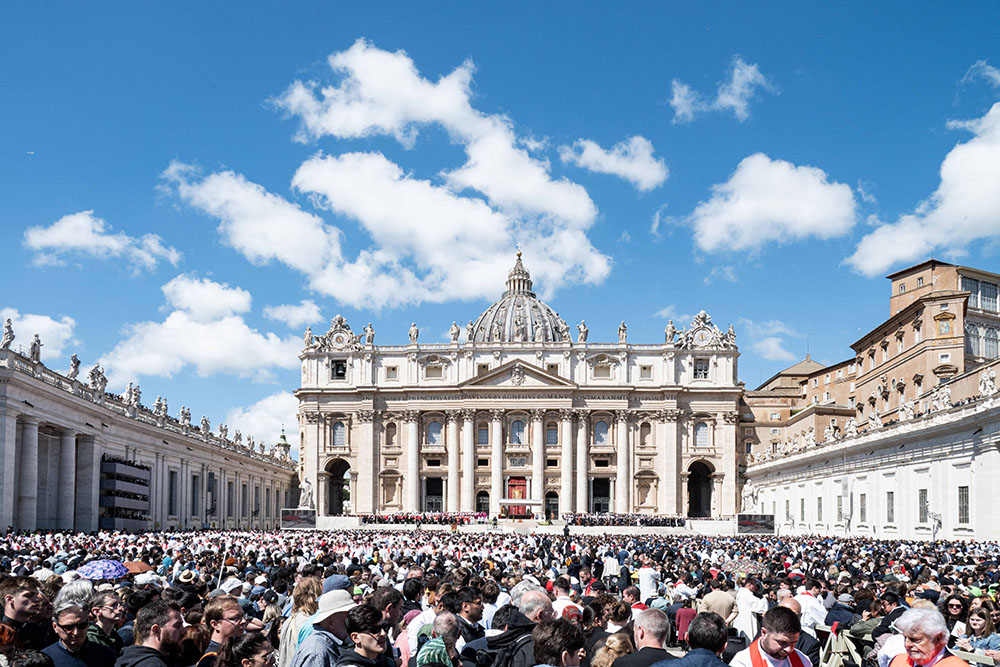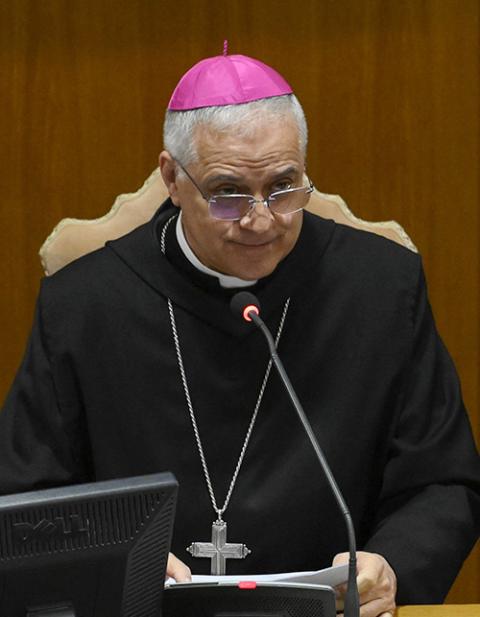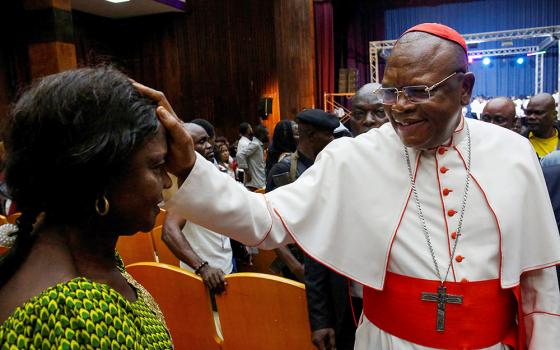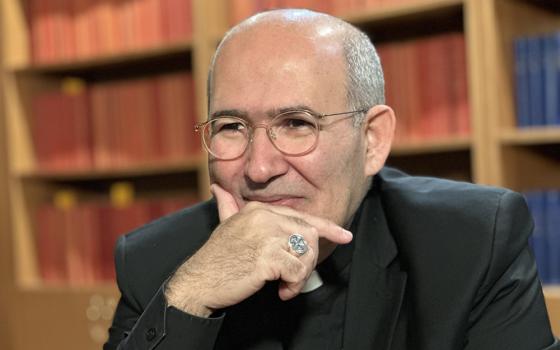
An estimated 200,000 people gather in St. Peter's Square and the neighboring streets to attend the funeral Mass for Pope Francis at the Vatican April 26, 2025. (CNS/Cristian Gennari, pool)
The key question facing the cardinals, and being addressed in the general congregations taking place this week, is a perennial question: What does the church need at this moment in time?
The question is misunderstood when it is framed as a choice between a liberal pope and a more conservative leader. Those categories have lost much of their salience in describing contemporary politics and they are even less useful when seeking to understand the church.
At the 1962-65 Second Vatican Council, there were two hermeneutical keys: aggiornamento, or bringing up to date, and ressourcement, or returning to the sources. By sources, the council fathers meant the Scripture and traditions of the church, especially the writings of the early church fathers.
Every document issued by the council reflects both hermeneutics and never once did the council prioritize one over the other. Instead, the two hermeneutics exist in creative tension: The path forward, the bringing up to date, is most clearly and soundly achieved by engaging the wellsprings of the tradition, the ressourcement. The two are inextricably intertwined.
This dynamic is not a Hegelian dialectic. Georg Wilhelm Friedrich Hegel's method began by identifying the flaws in any given cultural thesis. For the church, the creative tension is dialogical, in the strictest sense, a discernment through the word, or the Word, the Logos, Jesus Christ.
Christian discernment does not start with the identification of flaws, but with a search for evidence of grace. The "signs of the times" to which Catholics are called to pay attention are not a congeries of sociological data, a set of polling results, or any flavor of cultural commentary. When we look to the "signs of the times" we are looking for evidence of grace, of God's activity in the world. This point was made brilliantly by one of the cardinal electors, Jesuit Cardinal Michael Czerny in his book, co-authored with Fr. Christian Barone, Siblings All, Sign of the Times: The Social Teaching of Pope Francis.
Advertisement
The distinction between a more pastoral approach and a more dogmatic one can also be overstated. Pope Francis' pastoral approach was not undogmatic. "Dogmatic" is a negative adjective for Catholics only when it begets rigidity.
Francis proclaimed, fearlessly, the most essential dogmas of our faith: the merciful goodness of God, the transcendent dignity of the human person created in the image and likeness of God, the solidarity proper to brothers and sisters in the Lord, and the necessity of compassion as the ground from which healthy ecclesial and civic life must spring.
Every pope teaches. Every pope believes that the Holy Spirit speaks to us in the sacred Scriptures and in the tradition of the church. Some lean into the teaching itself as a source of grace while others focus on the application of the teaching in the real world, with real people. Those who lean into the teaching properly see God at work in that teaching, while those who follow a more pastoral approach see God incarnate in human need here and now.
But the distinction is not absolute and the two approaches can and must cross-pollinate. What does the church have to offer to suffering humanity today other than the teaching of the church? What relevance does that teaching have unless it is brought to the people of God in a way they can apprehend and embrace it?
The distinction can become a powerful, and corrosive, difference if that creative tension is lost. This was seen most clearly during the debates at the twin synods on the family in 2014 and 2015 when moral clarity was pitted against merciful pastoral application of the moral teaching.
Those who were suspicious of Francis seemed to suggest that the only thing for the church to do was to reiterate its teaching, plunk it down, and then their job was done. Others believed that the church should proclaim its teaching with great clarity, but apply it with equal mercy.
Francis' genius was to point out that mercy was itself the core of the teaching.
The means Francis adopted for maintaining this healthy creative tension is synodality. The goal of synodality is not to promote a particular agenda. It is a means to navigate the tensions between the two hermeneutics at the heart of Vatican II.
Indeed, synodality requires us Catholics to recognize that we belong to a rich and varied tradition and that the Holy Spirit is already active in the life and soul of everyone we encounter. Being a pastor is not like being a librarian or an archivist. Neither is it like being an inventor or a speculator.
Benedictine Abbot Donato Ogliari captured this tension well in his spiritual meditation at the beginning of Tuesday's general congregation. "The church rooted in Christ is a church that shuns self-referentiality and that knows how to go beyond its own boundaries in order to reach even those brothers and sisters in humanity who are not part of it and who experience the meaninglessness of life or are marked by the stigma of marginalization and exclusion," he said.
It is the rootedness in Christ that moves the church out of itself and into the world.
The great French Catholic philosopher Jacques Maritain once said that we are all born with a liberal heart or a conservative heart, and the greater part of intellectual success comes from seeking to understand the insights and wisdom proper to the kind of heart with which we were not born, and to ask what, again and again, how people who are different from us see and understand the world. It is too easy to paint those who are different as a caricature, a stick figure, devoid of complexity. Synodality requires that we encounter those whose heart is different from the kind of heart we possess.
What does the church need? More than anything, it needs a pastor like Francis who is committed to the synodal process as a means, the means, of keeping the balance between aggiornamento and ressourcement. There is no other recipe.
Renewal, moving forward, must be rooted in a deeper understanding of who we are as a church, letting the tradition water those roots. Nor is institutional and doctrinal maintenance enough: Roots spread or the tree dies.
Whoever steps onto the loggia of St. Peter's next week dressed in white needs to be someone who understands the value of synodality at a profound level.









